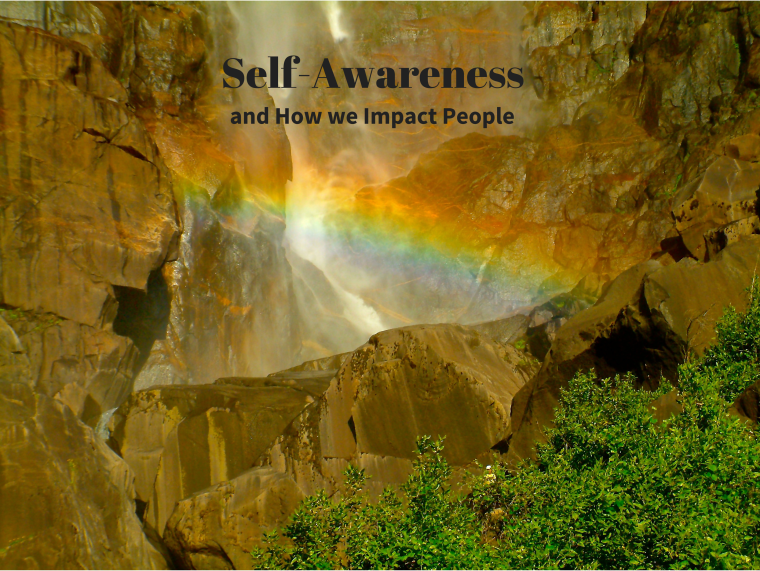Every spiritual journey takes us to the hardest realities in our lives, the monsters within us, our shadows and strongholds, our willful flesh, our inner demons. It is essential that we understand the enemies within us or we will inevitably project them outward on to other people.” – Peter Scazzero in The Emotionally Healthy Church
We all have blind spots. Our lack of self-awareness can cause us to offend, run over and alienate people we love. They react to what we say and we have no clue why. We get defensive, and the battle is on. Both parties are wounded and emotional walls go up and we are left wondering, “What just happened?”
Self-awareness helps us understand and manage our emotions. It gives us a greater capacity for social awareness and empathy. It is a critical building block for enhancing our relationships. Today we are going to take a brief look at what it is and how we can develop our own self-awareness.

Self-awareness is that ability to know what we are thinking, feeling, wanting, doing, and what triggers strong emotional reactions. It sounds easy, but it’s not. With the hectic pace of life we are frequently unaware of what is going on inside. Like the tide, the demands of life keep coming and we don’t take the time to reflect. We remain clueless.
We are warned in Proverbs 4:23, “Above all else, guard your heart, for everything you do flows from it.” In order to guard your heart, you need to know it. Our emotions provide a window to peer into our soul. In some Christian circles, emotions are ignored. Emotions are too messy. They can get us in trouble. “Just give me the facts. Emotions aren’t to be trusted.”
Here is a little exercise. What do you think these words are describing?
Compassion, anger, deep distress, amazed, indignant, love, hunger, troubled, overwhelmed with sorrow. Have a guess?
They are the emotions of Jesus as described in the book of Mark. If our Savior expressed emotions, then clearly emotions are an essential part of the human experience. The more we are aware of our own emotions, the more skilled we will be at reading the emotions of others. This awareness can lead us to empathetic responses and create closer relationships.
If you want to develop greater self-awareness, here are few things to consider:
Humility
It starts with humility. We are reminded in Proverbs 11:2, “When pride comes, then comes disgrace, but with humility comes wisdom.” Humility helps us acknowledge that we all have blind spots and weaknesses. It will open our hearts to honest feedback.
Feedback
It can be dangerous when we begin to “believe our own press clippings.” Accolades are nice, but they can make us blind to our weaknesses. We need to find safe people who will share the truth with us. We have a tendency to surround ourselves with people who will just say what we want to hear. But if we are going to grow in self-awareness we need to find people who are safe, gracious and willing to give us honest feedback. Here are some questions to ask:
- What are my strengths?
- What are my areas of immaturity?
- What have you observed triggers strong reactions in me?
- When my buttons get pushed, how do I tend to react?
- How have you seen me push other people’s buttons?
If you listen to their responses, you will become more aware of your weaknesses and triggers. This will enable you to strategize ways to respond when you sense your buttons are pushed.
Reflection
Hardships can evoke powerful and painful emotions. Our unwillingness to face and reflect on the pain will prevent us from learning and growing. It is wise to follow Peter Scazzero’s counsel, “It is essential that we understand the enemies within us or we will inevitably project them outward on to other people.”
Journaling is a powerful tool that can provide insights into our life. Reflecting on what we are feeling, thinking, and desiring not only provides self-awareness but health benefits. Research has found when people write about their feelings they are able to lower heart rate and blood pressure.
Perspective Taking
Perspective taking means asking ourselves, “If I were in their shoes what would I feel, think or do?” Too often we are just reacting to what people say and do. We need to slow down and ask these questions. As we learn to put ourselves in other people’s shoes, our awareness will be heightened. We will become more empathetic and thus strengthen our bonds of friendship.
Question: How self-aware are you? I encourage you to find a safe friend and ask the questions above. Reflect on their answers. If you are struggling with a friend, spouse, or co-worker take some time to do some perspective taking and journal your thoughts and emotions. You can leave a comment by clicking here.

Please note: I reserve the right to delete comments that are offensive or off-topic.